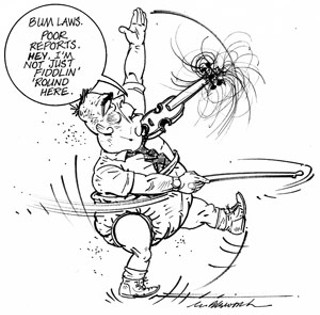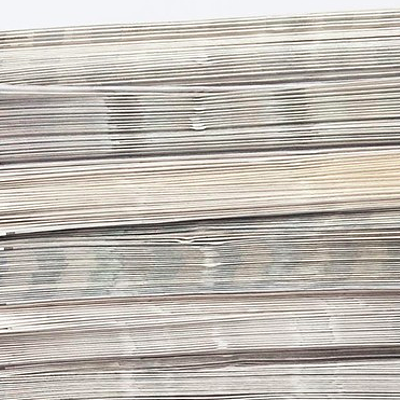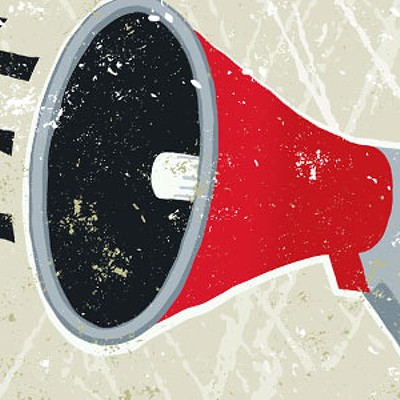It's been almost 19 years since the House of Commons voted unanimously to seek the elimination of child poverty by the year 2000. Yet nothing has changed. In 1989, 11.7 percent of Canadians under 18 lived below the poverty line. Today it's still 11.7 percent. Meantime, the so-called war on child poverty has morphed into a war on the poor themselves. That's shown, for example, by Nova Scotia's infamous squeegee law which took effect last month. It imposes fines for panhandling or offering to clean windshields on public roadways. The Tories claim it's a matter of safety, but that's pure bullshit since their law does not apply to people who wade into traffic soliciting money for charity or other "worthy" causes.
It's worth noting that the Liberals supported the squeegee law while the New Democrats opposed it (See correction below). "Begging is not a new activity," said the NDP's Maureen MacDonald, "and responding harshly through the law is not a new response." Indeed. British geographer Tim Cresswell told a conference on homelessness in Calgary that modern laws against begging originated more than 500 years ago in Berne, Switzerland, where city authorities resorted to branding and whipping to drive the wandering poor out of town. Today, Cresswell noted, authorities enact anti-begging laws and use surveillance cameras, private security guards and police to keep the poor moving. "People are not supposed to be sleeping in train stations or on street corners," Cresswell said. "People are supposed to be clean, odourless and purposeful." He noted that authorities everywhere are attempting to restrict the use of public spaces. Bus benches are built so they're "bumproof," or impossible to sleep on, either by making them barrel-shaped or putting armrests in the middle. In Los Angeles, nighttime sprinklers in public parks are designed to douse homeless sleepers while Halifax simply closes its parks after dark. And in both cities, public toilet facilities are almost nonexistent.
This physical war on the poor is reinforced by an economic one. A GPI Atlantic report released last week pointed out for example, that Nova Scotia has the third lowest minimum wage in Canada and that between 1981 and 2007, it increased by a paltry 29 cents an hour when adjusted for inflation. Yep, a 29 cent raise in 26 years. And over the last two decades, Nova Scotia welfare rates, already thousands of dollars below the poverty line, have declined sharply. Single, employable welfare recipients lost 21.9 percent of their benefits, the disabled lost 21.2 percent and single parents on welfare lost seven percent.
In his April 2008 report on income inequality in Canada, Dal prof Lars Osberg points out that the country's wealth grew by nearly 40 percent in the years when welfare rates plummeted. He notes that Canada signed the UN's 1948 Universal Declaration of Human Rights yet fails to live up to many of its provisions. Article 25, for example, specifies the right to adequate "food, clothing, housing and medical care." In 2006, the United Nations' Committee on Economic, Social and Cultural Rights criticized Canada's provinces and territories for cutting welfare rates, noting that the rates "do not provide adequate income to meet basic needs for food, clothing and shelter."
Rising levels of poverty are so obvious that even the NS Tories have noticed. Last December, they set up yet another committee to recommend solutions. In June, the working group, as it's called, recommended reforms such as higher welfare rates and more affordable housing. The Tories responded with a decisive announcement. By gum, they declared. We'll study this here report and get back to you, well, sometime next year. Their news release ended with a reminder that June 28 marked Nova Scotia's first Poverty Reduction Day. It warmly encouraged everyone "to organize and participate in events aimed at reducing hardships that far too many Nova Scotians face on a daily basis."
Incredible, man. Fucking incredible.
CORRECTION:The original line said, "It's worth noting that the Liberals supported the squeegee law while the New Democrats voted against it." While the NDP opposed the squeegee provisions - they tried twice to eliminate them from the package of overall changes to traffic safety laws - in fact they voted for Bill 7, which also included a ban on driving while holding a cellphone, tougher restrictions on street racing and improvements in crosswalk safety. The NDP has suggested it will rescind the squeegee provisions if it comes to power (August 6, 2008).
Send your suggestions for reducing hardship to [email protected].
















